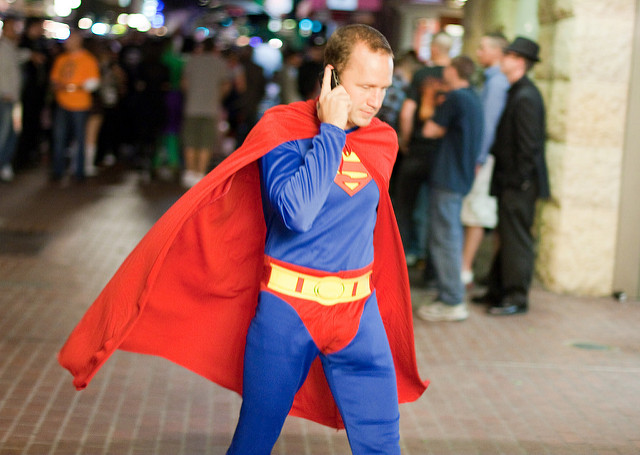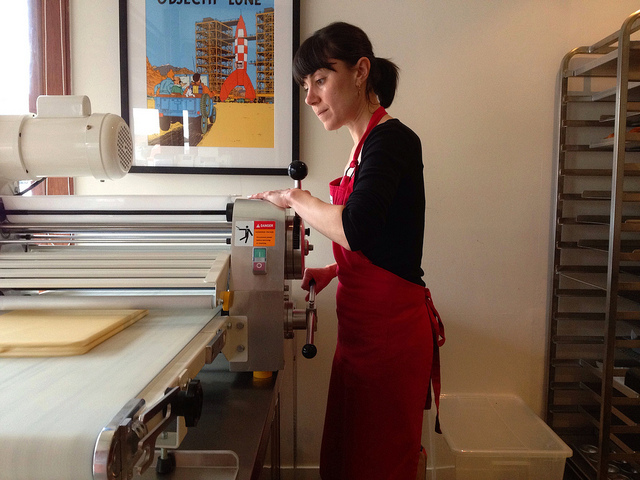Unlock the Magic in Your Story Now
Get the Free 20 questions to Ask Before Launching Your Idea workbook when you sign up for occasional updates.
Get the Free 20 questions to Ask Before Launching Your Idea workbook when you sign up for occasional updates.
Make Fewer Promises
filed in Marketing, Storytelling, Strategy
 It’s a Saturday night. Jeff, the on-call Planning Enforcement Officer for the local council, is just about to sit down to a takeaway meal and a movie with his wife when his phone rings. Residents close to a new nightclub want him to come and assess the noise levels at the venue. Even before the conversation starts, Jeff is not primed to listen. What he thinks is a good outcome—getting the caller off the line in the quickest time possible, doesn’t align with what the caller thinks is a good outcome—Jeff dropping everything and getting around to the nightclub in the next thirty minutes.
It’s a Saturday night. Jeff, the on-call Planning Enforcement Officer for the local council, is just about to sit down to a takeaway meal and a movie with his wife when his phone rings. Residents close to a new nightclub want him to come and assess the noise levels at the venue. Even before the conversation starts, Jeff is not primed to listen. What he thinks is a good outcome—getting the caller off the line in the quickest time possible, doesn’t align with what the caller thinks is a good outcome—Jeff dropping everything and getting around to the nightclub in the next thirty minutes.
Misaligned expectations are the greatest source of dissatisfaction in any service interaction. You can’t begin to satisfy or delight your customer unless you are prepared to meet his expectations. Two things need to be in place to make that happen. Firstly, you need to understand the customer’s desired outcome. And secondly, you need to have the resources and the willingness to meet it.
If the last thing Jeff wants to do when he’s on call is get in his car to investigate complaints, then it’s unlikely he’ll satisfy ratepayers. The way he handles incoming calls is affected by his desire to enjoy a quiet night at home. His tone will be defensive and his manner abrupt. The organisation does more harm than good by having a 24-hour hotline that sets the expectation that an officer might visit in an emergency if that’s unlikely to happen.
Excellence is about making fewer promises that you always keep.
Image by Nathan Rupert
Share this article
Choosing To Be Better
 Every business begins with a choice to be better. Not necessarily to be better than the competition, but to be a better option for the people it hopes to serve. As we become mired in the day-to-day work of business building, we can lose sight of our original intention.
Every business begins with a choice to be better. Not necessarily to be better than the competition, but to be a better option for the people it hopes to serve. As we become mired in the day-to-day work of business building, we can lose sight of our original intention.
Nike’s Bill Bowerman chose to be better at creating innovative shoes that would enhance every athlete’s performance. The company is still making the same choice today.
Kate Reid chose to make better croissants. She’s gained international recognition and built a thriving business by staying true to that intention.
What did you choose to be better at and why? How are you staying true to that choice?
Image by eMeow
Share this article
Why Do You Want To Tell A Good Brand Story?
filed in Marketing, Storytelling, Strategy
 Why do you want to get better at storytelling?
Why do you want to get better at storytelling?
When I ask clients and potential clients that question, I get a mixed bag of answers.
By far the most common reason is to increase brand awareness. Conventional wisdom argues that the more people who know about your product or service, the greater chance you have of selling more products and services. The simplest way to make everyone aware is to buy the attention of the most people. But the downside to that strategy is that you’re wasting resources speaking to people who have no interest in hearing or buying from you.
The second most common answer is to speed the process of attracting more customers. This mindset can lead business owners down the path of compromise, which presents its own unique set of challenges. You can’t do your best work when you start appealing to customers who don’t share your worldview. When you do, you attract the kind of customers your business is not designed to serve well.
Another reason commonly offered is to make sure to be seen in the right light by the right people. And while it’s smart to think about the audience you hope to engage with, you need to be mindful of telling a story that isn’t true just because it resonates with the people you’re speaking to.
Three Lessons From Great Brand Storytellers
1. Allocate resources where they have the most impact.
2. Get clear about the kind of customers you do and don’t want to attract.
3. Be as good at turning off the wrong customers as you are at attracting the right ones.
Your marketing motivations will ultimately inform your brand strategy and marketing tactics. That’s why it pays to know not just what you want to say and how best to say it, but also to understand why it’s important to you to say it at all.
Resonance begets belonging and belonging scales.
Image by rotesnichts
Share this article
Now Vs. Next
 We’ve come to believe that the ability to focus on the future is the cornerstone of achievement, success and progress. But we’re in such a hurry to get there we often sacrifice the opportunity to do our best work in this moment. The irony, of course, is that tomorrow’s success is dependent on the groundwork we do today. Begin where you can. Start here.
We’ve come to believe that the ability to focus on the future is the cornerstone of achievement, success and progress. But we’re in such a hurry to get there we often sacrifice the opportunity to do our best work in this moment. The irony, of course, is that tomorrow’s success is dependent on the groundwork we do today. Begin where you can. Start here.
Image by Javi
Share this article
Who Will You Impact?
filed in Storytelling, Strategy, Success
 The bus headed back over the Golden Gate Bridge as we neared the end of our tour of Sausalito. The driver pulled over at the second last stop and turned off the ignition so that he could ‘address his guests’. Then Dwayne Johnson (the man who had the name before the celebrity who made it famous), stood facing us, looking out towards the iconic bridge in the background.
The bus headed back over the Golden Gate Bridge as we neared the end of our tour of Sausalito. The driver pulled over at the second last stop and turned off the ignition so that he could ‘address his guests’. Then Dwayne Johnson (the man who had the name before the celebrity who made it famous), stood facing us, looking out towards the iconic bridge in the background.
He explained that he loved the city he had called home for almost sixty years. He told us he regarded his job as both a pleasure and a privilege. And then he began to evangelise about the stunning monument we’d just driven across.
‘This bridge will be the standard for every bridge that will ever be built,’ he said. ‘They say Disneyland is magical. No, this bridge is magical. Even guys take selfies on this bridge.’
Dwayne explained that although it was a cold day, we were in San Francisco at a beautiful time to experience it. On foggy days much of the bridge is obscured from view. He told us that he drives across it every day, but he walks across it at the weekend whenever he can. And then he invited us to get off the bus and do the same, even though we didn’t have to because the bus was going back across it anyway.
‘Maybe you think it’s too cold or you’ll do it next time. But you don’t know if you’ll be back. And one day, when you get home, and you’re showing the photos of your trip to friends they will ask you if you walked across the bridge. Your trip will be defined by that.’
Then Dwayne stood back and gave us a moment to decide. Half of the passengers (many of whom would have left a tip in the tip jar on the dashboard at the end of the trip), left the bus to walk across the magnificent Golden Gate Bridge, as our guide got back in his seat and turned the ignition.
Dwayne Johnson doesn’t own Big Bus Tours. But he does own the power he has to touch people’s lives every day. Who will you impact today?
Image by 305 Seahill
Share this article
Who Cares?
filed in Marketing, Storytelling, Strategy
 It’s easy to assume that a delicious meal is about the magic that happens when the chef, who we think has the most skin in the game, directly influences the end product. Is the perfect plate of pasta a result of the quality of the ingredients or the skill of the chef? How much does the ambience of the restaurant or the waiter’s service influence our perception of how good the food tastes?
It’s easy to assume that a delicious meal is about the magic that happens when the chef, who we think has the most skin in the game, directly influences the end product. Is the perfect plate of pasta a result of the quality of the ingredients or the skill of the chef? How much does the ambience of the restaurant or the waiter’s service influence our perception of how good the food tastes?
In any well-oiled restaurant or company, every individual understands their role in the value chain. But efficiency is only one element of a great product or experience. We know that meeting an expectation is an end to end process, which begins before the customer arrives and finishes as she leaves. But we have the opportunity to make it more of a virtuous cycle by caring.
The things that delight us are born in moments when people who care bring their skills together to create a future they want to see. Care first. Strategise later.
Image by Bruno Cordioli
Share this article
Marketing 101
 The queue outside Chinatown’s Golden Gate Bakery extends all the way down the street. More people join as customers are served, so the line never gets shorter. Sometimes people show up hoping to buy the famous egg custard tarts through the front door even when the bakery is closed. Locals know to come early and bring cash. Puzzled tourists wonder what they’re missing out on when they see the lines and delighted customers clutching bright pink boxes. Many join the queue and come away with a dozen egg tarts too.
The queue outside Chinatown’s Golden Gate Bakery extends all the way down the street. More people join as customers are served, so the line never gets shorter. Sometimes people show up hoping to buy the famous egg custard tarts through the front door even when the bakery is closed. Locals know to come early and bring cash. Puzzled tourists wonder what they’re missing out on when they see the lines and delighted customers clutching bright pink boxes. Many join the queue and come away with a dozen egg tarts too.
The Golden Gate Bakery is an example of marketing 101.
Marketing 101
1. Make something people want.
2. Consistently deliver on your promise to your customers.
3. Give them a way to spread the story about the thing you made.
If you tick all three boxes, then you’ve got a marketing plan.
Image by Gary Stevens
Share this article
Meaning And Work
filed in Success
 Yesterday I met James on a bitterly cold day in San Francisco. He is employed by the City and works close to the magnificent City Hall. It’s hard to describe James’ enthusiasm as he guides each visitor through the facility he manages. He is empathetic and professional—intructing people on how to use the facilities and diligently recording the time and duration of visits. James is proud that the City will be using this data to improve how it serves people. He explains that he interviewed for the position and moved to San Francisco to take the job he now loves as a Pit Stop Monitor.
Yesterday I met James on a bitterly cold day in San Francisco. He is employed by the City and works close to the magnificent City Hall. It’s hard to describe James’ enthusiasm as he guides each visitor through the facility he manages. He is empathetic and professional—intructing people on how to use the facilities and diligently recording the time and duration of visits. James is proud that the City will be using this data to improve how it serves people. He explains that he interviewed for the position and moved to San Francisco to take the job he now loves as a Pit Stop Monitor.
‘I used to be in jail, you see, and now I get to learn and contribute and meet all kinds of interesting people each day.’ he says, producing hand sanitiser with a flourish. ‘You might as well make the visit worth your while.’
As I walk away I can’t help wondering what the world would be like if every one of us shared James’ worldview about our work and our contribution.
Image by Paul Sableman
Share this article
How’s Business?
 When Mr Ryan, the Dublin greengrocer, was asked how business was forty years ago he would likely have counted the day’s takings. But that wasn’t his only measure of success. The connection with loyal customers was the lifeblood of his business. Mr Ryan relied on repeat business. His survival depended on his ability to create enough value for customers to stop them walking the extra five minutes to the supermarket up the road in Terenure village. He couldn’t compete on range and price, but he could compete on connection.
When Mr Ryan, the Dublin greengrocer, was asked how business was forty years ago he would likely have counted the day’s takings. But that wasn’t his only measure of success. The connection with loyal customers was the lifeblood of his business. Mr Ryan relied on repeat business. His survival depended on his ability to create enough value for customers to stop them walking the extra five minutes to the supermarket up the road in Terenure village. He couldn’t compete on range and price, but he could compete on connection.
In an increasingly competitive and globalised world, we often forget that the amount of money in the register at the end of the day isn’t the only metric of success. More isn’t the only means by which to measure greatness.
A great company—whatever its size, respects and nurtures the people it employs and the customers it serves. A great company doesn’t just thrive because it’s profitable, it’s profitable because it helps people to thrive. Great companies leave the world better than they found it—which is why those of us responsible for creating and building businesses must be as clear about the way we get to our destination, as we are about what that destination is.
So, what does this mean in practice? We need to give our customers reasons to stay connected to us and not just reasons to buy from us today. Like Ryan’s, the businesses that are doing good and doing well are the ones that are closest to their customers. How’s your business?
Image by Garry Knight
Share this article
Storytellers Create Value
filed in Marketing, Storytelling
 Melbourne’s newest bean to bar chocolate maker’s glass-walled factory and bright, airy cafe is stunning. Their packaging is beautiful, and their small-batch chocolate bars are delicious. The stage is set to deliver an incredible customer experience. And yet that experience promised on the roaster’s website falls flat—for want of training their staff in the art of engagement and storytelling.
Melbourne’s newest bean to bar chocolate maker’s glass-walled factory and bright, airy cafe is stunning. Their packaging is beautiful, and their small-batch chocolate bars are delicious. The stage is set to deliver an incredible customer experience. And yet that experience promised on the roaster’s website falls flat—for want of training their staff in the art of engagement and storytelling.
The chocolate roaster is a destination brand. Most customer’s who visit are not simply passing by—they come intentionally for an experience, not just to make a purchase. It’s vital that the founder invests in training her staff to understand that their job is not about completing transactions, swiping credit cards and wiping down tables.
When you pay $5 for 27g of chocolate, you’re not only buying the quality of the ingredients, and the manufacturing process—you’re buying a story. The manufacturing and sales teams are the glue that connects the customer to founder’s intention and the brand’s story. If they’re not passionate about the story and excited to share it with the customer, then they’re not creating the value they could be for the business.
Why go to the trouble of sourcing and hand sorting single origin beans in a ten-step process to make the best chocolate bar you can make, without finding the right people to share that story? There’s no point in setting the stage if the actors don’t understand the importance of the script.
A good story can’t save a bad product, but it can make a good product great.
Image by Stuart